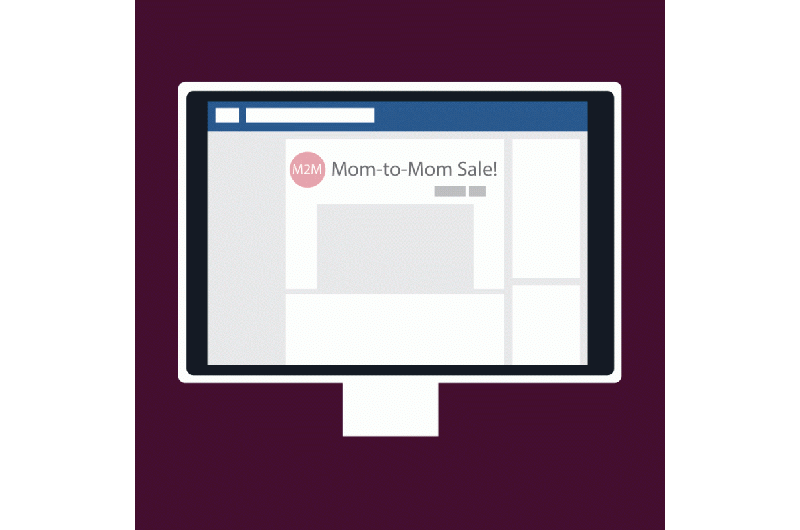Research finds Facebook groups for moms to buy, sell baby items built on trust

If you know what M2M, PPU, EUC, POOS and ISO mean, chances are you have engaged in a highly successful form of social media-based buying and selling that University of Michigan School of Information researchers are calling "community commerce."
This modern online take on the garage sale is growing in popularity with people coming together in Facebook groups, typically called Buy/Sell/Trade groups, to transact with others who live nearby. A new study from School of Information researchers looked at how these groups work and why they are successful.
The research team specifically focused on "Mom-to-Mom" groups (also called Mom-2-Mom or M2M), in which mothers buy and sell gently used baby items, such as clothes, toys and books. They offer the items for porch pick-up (PPU) on a designated Facebook page and send private messages (PMs) to disclose the location and other pertinent information. Purchasers show up at a home, leave money behind and retrieve items from the porch.
In their study, the U-M researchers observed four M2M Facebook groups for six months and interviewed 18 mothers who were members of two of the groups. They found that moms turn to M2M groups because they perceive them to be safe and trustworthy.
"Even though Facebook does not offer any conventional e-commerce mechanisms to support trust, such as search engines, reputation systems or guarantees the way sites like eBay do, moms felt they could trust other moms they were transacting with," said lead author Carol Moser, a doctoral student at the U-M School of Information.
"Something unique about Facebook is that sales are visible to all group members. Moms talked about how having witnesses to their transactions helps keep members accountable for following rules and being responsive."
Another reason for trust: groups are seen as exclusive and not just anyone can join. Most groups are "closed" and admission is up to an administrator who can decide who to let in based on their profile. Members have to follow group rules, such as showing up to pick up the item when they said they would and not reselling an item at a higher price in another M2M group. People who are caught violating rules are warned or banned by administrators.
When a buyer wants to purchase a product, she comments on the sale post to say she is "int" or interested. This creates an agreement between the buyer and seller, who rarely actually meet.
Another reason for the success of these groups, researchers said, is that moms find them easy to use and convenient. Items show up on moms' Facebook news feeds on their mobile phones, so they can manage the transaction in just a few seconds. Selling is also easy and takes much less time than organizing a garage sale or going to the post office to ship items.
The model works for other groups as well, researchers said.
"In Michigan, there is a group dedicated to trading trucks, parts and related items all centered on the idea of mudding, where you go out off-roading. To nonlocals, this might seem obscure but the group currently has over 160,000 members," said co-author Sarita Schoenebeck, assistant professor at the School of Information. "This kind of local, peer-to-peer exchanging of goods and services is likely to keep growing and may fundamentally impact the exchange of used goods in sharing economies."
The team calls this community commerce because of its strong reliance on local communities to work properly. The researchers suggest, however, that this kind of commerce might work differently, or not work at all, in communities where trust is low. For example, in communities where crime is high and trust is low, people may not feel safe sharing home addresses or walking up to strangers' porches to pick up items and drop off money.
The researchers also note concerns about the potential for bias and inequality in these groups. Admins have a lot of centralized power to decide who looks trustworthy or not based on profile information. Studies of other peer-to-peer economies like Airbnb have raised concerns about racial profiling and other stereotyping based on user' profile information. The researchers say that a community's shared group identity could be used as justification for excluding others based on gender, race, sexual orientation, religion or political beliefs.
"One of the surprises for me was that moms did not report forming social relationships with other moms they bought or sold from. They trust each other, but don't necessarily want to become friends," said co-author Paul Resnick, the Michael D. Cohen Collegiate professor at the School of Information.
More information: Community Commerce: Facilitating Trust in Mom-to-Mom Sale Groups on Facebook: yardi.people.si.umich.edu/pubs … munityCommerce17.pdf
Provided by University of Michigan



















